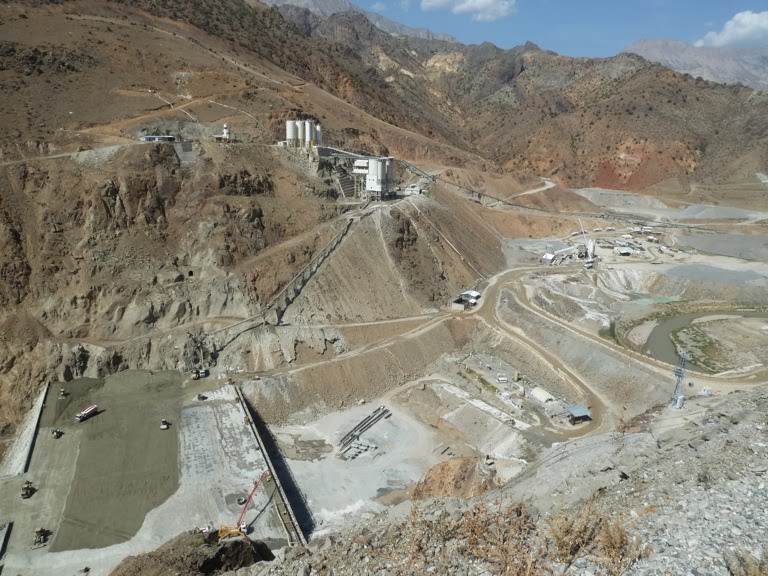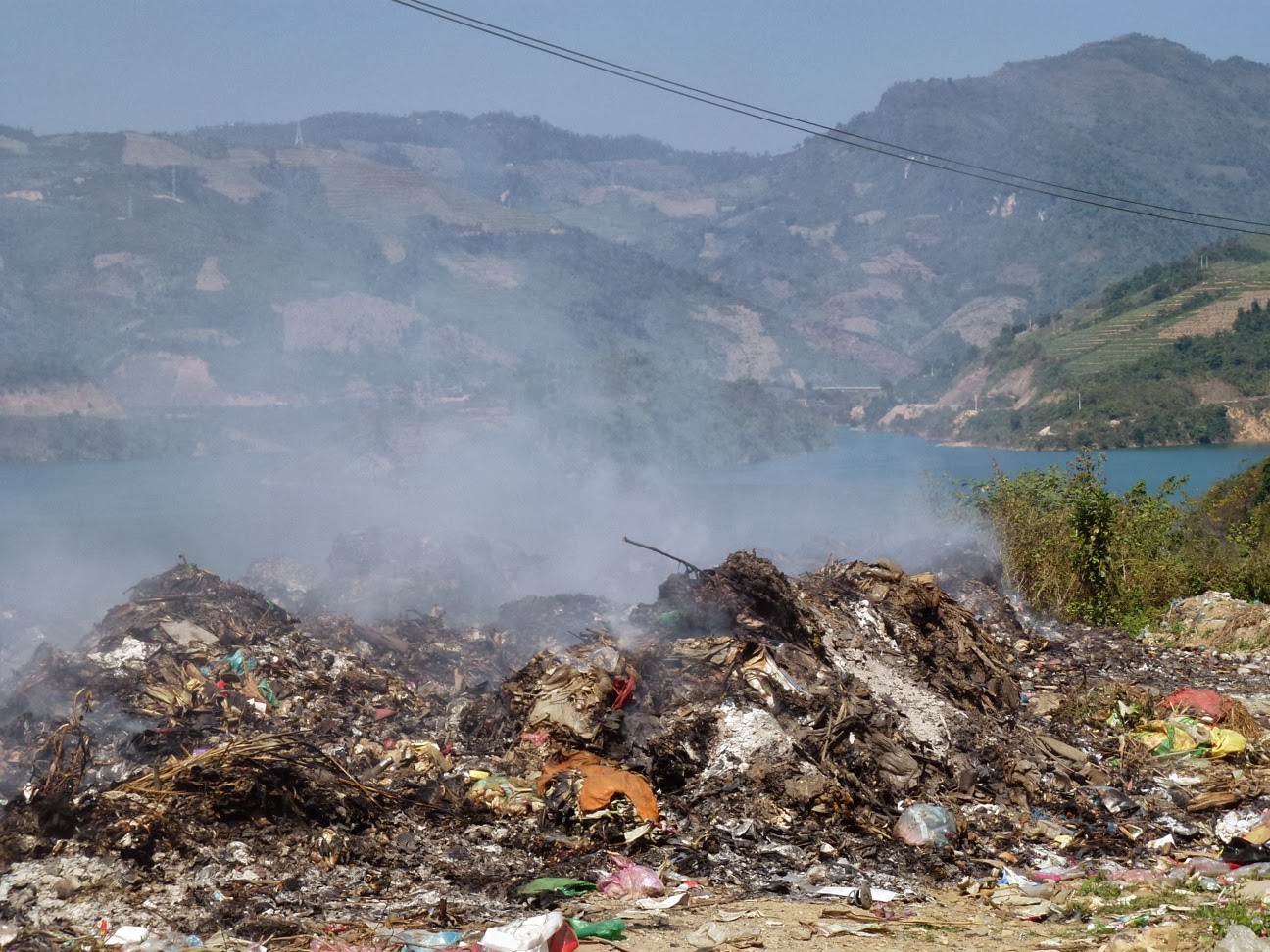One would be a fool to journey for a year and celebrate the world’s wonders without being struck by its horrors. Ironically this year of adventure has probably lead us to spend more time searching the internet than ever before, researching our path ahead. Browsing blogs and sites for information and inspiration has made me realize just how easily we can tell just one side of a story, or how simple it is to take a pretty photo and block out the destruction beyond the frame. Perhaps we should have shared more of this 'dark side' as we've journeyed instead of lumping it all in here, I don't know. Anyway here’s an attempt at a sobering and honest blog, the dark side, showing some grim realities and sadnesses that should never be ignored. It's by no means an exhaustive list of our challenging experiences and as is the case with so much of what we observe, we are left with many questions and uncertainties. What we observe is just a glimpse, but a real glimpse nonetheless.
Dams,
dams, dams. Plenty of them around, some
countries seem to have developed a particular obsession for them. As we made
our way down this beautiful Georgian Valley the stunning mountain scene was
suddenly scarred by this enormous hydro-electric lake. Choked with logs, the
water quality plummeted to a smelly brown slop, the water fluctuation level
leaving a great scar on the hillside.
Turkey
is developing it’s hydro-electric network at a phenomenal rate. All over
Eastern Turkey we witnessed dams and more dams under construction. Formerly
free flowing rivers have been drowned. The valley upstream from this large
project was home to dozens of beautiful villages and orchards which will soon
be inundated.
The Nam
Na river in Vietnam has been reduced to a series of hydro-electric lakes. The
resettlement of people was obvious as we passed by villages of mass uniform
housing at the new high water level. At their best the lakes came near to being
scenic from a distance, at their worst they were completely stagnant, and full
of this oily green slime. I was almost reduced to tears as we passed by a small
village whom no doubt used to have a healthy stream running through their
centre and now have to eek out a desperate looking life right on the banks of
this filth. We passed by here as my bottom bracket broke down, my troubles seemed so measly in comparison.
Sadly
there is more to come, roadside billboards mark these proud aspirations. The
Gaizi river along which runs the famous Karakoram highway in China looks to
soon fall victim.
It
is said that Laos aims to be the ‘battery of South East Asia’. With huge river
resources at it’s disposal it seems that Laos is very much rolling up it’s
sleeves and getting stuck into the work of daming it’s rivers. I thought this
billboard gave an interesting and disturbing insight into the mindset and the
pride which is taken in these developments. Currently Laos, against all
recommendations is planning the Don Sahong dam just a few kilometres downstream
from where we stayed on Dong Khong Island. Predictions are that this dam would
severely restrict the migration of fish on the Mekong. When one considers the
food chain it’s sad to think of the likely outcome for the few Irrawaddy
Dolphin and the less famous Giant Catfish, not to mention the 60 million people
living in the Lower Mekong basin who feed from this river.
Laos,
Thailand, Cambodia and Vietnam have signed up to the ‘Mekong River Commission’, and yet
between them are planning 11 dams for the Lower Mekong! China lies upstream and
is unwilling to partake in the commission, currently constructing multiple
Mekong dams themselves. In a country as heavily touristed and ‘open’ as Laos
it’s easy to presume there is a freedom of speech around such issues.
Shockingly river protection activist Sombath Somphone was captured at a Police
checkpoint in Vientianne in December
2012 and as been missing since.
Right
in down town Rome, just a few minutes walk from the Colosseum, the Fontana de
Trevi, and the Vatican, while wandering beside the Tiber river these squatters
were in full view. The place stunk like piss and the river won’t have to rise
much before they’re forced on to other places. To see this poverty in Central Rome caught me by surprise and the
contrast with the wealth all around was striking.
Attitudes
to rubbish disposal amaze me. It’s hard to figure out to what degree mess like
this is a result of inadequate resources for better disposal systems and what
is simply attitudinal. Perhaps the careless attitude evolves as a result of not
having many better options. It’s hasn’t been uncommon though for us to sit in
an eatery that’s floor is completely littered with old tissues, bottles and
food scraps. When many people take such pride in tidiness, perhaps sweeping
their mud floors with their cane broom, how strange that others can be totally
ok living in such squalid mess.
During
the Vietnam-American War the Americans were also fighting their secret war in
Laos, the full truth of which only began to be revealed far later. Laos became
the most bombed country in history and many of it’s forests were stripped by napalm
attacks. Doubled with a traditional ‘slash and burn’ approach to agriculture
and the hills have been left as a patchwork with enough forest left to show the
previous splendor but much of it stripped back to scrubby regrowth.
The
far north of Cambodia was a desolate place, the most haunting ride of our
journey for me. Cycling through bare land, scorched black from burn off, with
huge areas of forest cut down was like cycling through a graveyard, a graveyard
of large trees that have been toppled. A
few folk live in huts amongst the carnage and for them life looks extremely
tough. I have little idea to what degree this depravity was brought about by
large scale industry and what was simply local loggers, either way the result
is awful, the land laid to waste, now just dead stumps and smouldering ground.
The village of Koh Knear sits amongst several palm trees, a tiny island of
shade left in this parched land. I looked on in silent disbelief as a man hacked
down another tree with powerful swings of his axe, I simply could not
understand.
As
we rumbled across China by train this scene was repeated literally hundreds of
time. The speed of development is outrageously bizarre. Considering they have a
‘one child’ policy the mind boggles as to who these high rise apartments are
being built for.
I
couldn’t help but think development at this rate will surely leave a great un-used
mess in times ahead. Throughout many of the ex-Soviet countries that we visited
we saw unused or unfinished buildings, often hospitals, schools and apartment blocks, that may have had their heyday but more recently had been deserted as they no
longer had a use or the resources to upkeep them. Will China be filled with
vacant or incomplete apartments in the future?
The
morning we crossed the border from Iran to Turkey we passed an astonishing
number of trucks, all parked up and waiting their turn to cross the border or
transfer goods. For 5km on each side of the border they lined the roadside.
Much smaller than many international shipping ports it was still a reminder of
the huge amount of resource that gets poured into carting our goods around the
planet so we can have whatever we want, whenever we want it.
What kind of prick keeps a Monkey on a one foot chain stuck under the table on the floor of a grotty eatery? Looking into the eyes of this little dude was just like looking into the eyes of a little human. His life must be hell.
These nomadic Berber people live high up in the Atlas mountains of Sahara. It's one thing to live in poverty in a place with mild climate and a chance at growing some food but seems like quite a different scene to be poor in a place like this. The winters are harsh, with sub-zero temperatures and snow on the ground, while summers are baking hot with extremely little rainfall. As the climate changes the winter snowpack is getting less putting greater pressure on their already precious water supply.
These nomadic Berber people live high up in the Atlas mountains of Sahara. It's one thing to live in poverty in a place with mild climate and a chance at growing some food but seems like quite a different scene to be poor in a place like this. The winters are harsh, with sub-zero temperatures and snow on the ground, while summers are baking hot with extremely little rainfall. As the climate changes the winter snowpack is getting less putting greater pressure on their already precious water supply.
All this got me to musing - is it not a very scary thought that each new generation sees the current state of the planet as the norm?! How massively important it is that we take some time to dwell on what has already been ruined, to mourn what has already been lost. Not to become incapacitated and depressed but rather to motivate us into some positive response to protect all the wonders that still exist, to remember that carnage need not be the norm! I love this book "Sensational Survivors" by Kiwi author Sandra Morris, it delves into the tragedy of what we have lost forever and the huge sadness of that, while also marveling and celebrating all that still exists. Without remembering the losses we forget the fragility of what we have and the responsibility that comes with being human.
Ollie
Ollie
















Hey guys! This is Dae from Hanoi. I was researching some routes from Kamphong Cham to Phnom Penh and stumbled across your blog. Glad you guys are doing well and keeping up with your amazing blog. I will be in Phnom Penh in a day or two. Would love to catch up if you are still in town.
ReplyDelete